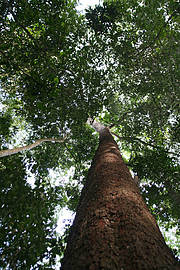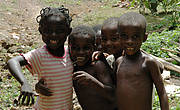IUCN in Ghana Releases New REDD+ Documentary
14 September 2013 | Video
The International Union for Conservation of Nature (IUCN) “Towards Pro-Poor REDD+” project in Ghana recently released a 30-minute documentary, profiling how Ghana’s efforts to reduce emissions from deforestation and forest degradation (REDD+) are addressing climate change and the needs of the poor.
Through interviews with key forestry officials, experts and stakeholders, the documentary entitled “Promoting a Pro-Poor Approach to REDD+ in Ghana”, explains why the REDD+ mechanism is needed in Ghana; why forest dependent communities, especially women, must be involved in all stages of REDD+ readiness and implementation; and how IUCN is continuing to support these efforts.
“The extreme weather conditions bring in its wake a lot of destruction through drought or flooding. The only way to check this situation is through reforestation programmes,” states Nana Essandoh, Chairman of the Sureso/Pebaseman/Achichire community resource management area, and member of the Wassa Amenfi West District REDD Multi-stakeholder platform.
The Wassa Amenfi West District of the Western Region of Ghana is the pilot site for IUCN’s Pro-Poor REDD+ project in the country.
“As we sit here now, the weather is not good for us. It is changing… we can see that all these illegal activities are affecting the weather. So it’s about time we start with REDD+, by planting trees, by preserving and protecting the forests,” states Dorothy Ewusi, another member of the Wassa Amenfi West REDD Multi-stakeholder platform.
The documentary also emphasizes the need to understand linkages between poverty and forest use. “About 33 per cent of incomes for forest communities-- cash and non-cash-- actually come from the forest. And this is approximately US$250 per person per year, which is very significant. This shows the huge contribution that forests are making to the livelihoods of communities and thus the importance of understanding this linkage between poverty and forest use,” says Saadia Bobtoya, IUCN’s REDD Project Officer in Ghana.
The documentary recently aired on Ghana’s state television station (GTV) in May 2013, and the full version is available on IUCN’s YouTube channel.
More on IUCN’s “Toward Pro-Poor REDD+” Project in Ghana
With funding from Denmark’s Development Cooperation (Danida), IUCN has been working with its local partners in Ghana to facilitate and improve the participation and involvement of forest dependent communities in national REDD+ implementation, while enhancing synergies between REDD+, forest governance and poverty reduction.
The first phase of the pro-poor REDD+ project in Ghana between 2009 and 2012, has significantly contributed to the development of the REDD+ process at both national and local levels, and has ensured that the needs of the poor are integrated into Ghana’s national REDD+ strategy. Very useful lessons have been generated from the implementation of project activities at both national and pilot levels, which have helped to shape ideas and tools for enhancing good forest governance and sustainable livelihoods.
IUCN’s Pro-Poor REDD+ project is active in five countries, namely Cameroon, Ghana, Guatemala, Papua Province of Indonesia and Uganda. The implementation of the project is based on three components: developing synergies between REDD+ mechanisms and good forest governance; linking local and national level stakeholders and processes for REDD+; and enhancing knowledge and communication for building and implementing REDD+. Through multi-stakeholder dialogues, a major global-level output from the project has been the identification of seven key principles for how the REDD+ mechanism can address the needs of the poor.




